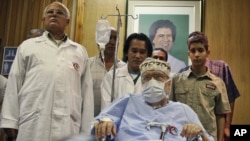A former Libyan intelligence officer convicted of the 1988 Lockerbie bombing has died of cancer in Tripoli, nearly three years after Scottish authorities released him from prison on compassionate grounds.
Abdel Baset al-Megrahi died at his home Sunday at the age of 60. He was the only man convicted of the Pan Am Flight 103 attack that destroyed a U.S. passenger jet over the Scottish town of Lockerbie, killing 270 people, 11 of them on the ground.
Al-Megrahi was found guilty of involvement in the bombing in 2001, two years after then-Libyan leader Moammar Gadhafi handed him over to face trial.
Al-Megrahi served eight years of a life sentence in a Scottish prison before authorities released him in 2009, citing his struggle with prostate cancer. Doctors at the time said he had only three months to live.
His release triggered outrage from many families of the victims. The U.S. government also criticized his release.
British Prime Minister David Cameron says he believes al-Megrahi should never have been freed. Speaking from the NATO summit in Chicago, Mr. Cameron said the Libyan's death is an occasion to remember the 270 people who were killed in what he called "an appalling terrorist act."
Timeline in Lockerbie Bomber Case
1988: Pan American Airways Flight 103 is bombed over Lockerbie, Scotland, on December 21, killing 259 passengers and crew, most of them Americans, and 11 people on the ground. Libyan suspects are accused of plotting the attack.
1992: The U.N. Security Council imposes sanctions on Libya in an effort to force the government to hand over two of its citizens wanted for the Lockerbie bombing.
1999: Libya hands over two suspects wanted for the attack on Pan Am Flight 103. The United Nations suspends sanctions against Libya but does not lift them.
2001: A Scottish court on neutral territory in the Netherlands convicts Abdel Baset al-Megrahi of the Lockerbie bombing and sentences him to life in prison. The other Libyan suspect is found not guilty.
2003: Libyan leader Moammar Gadhafi signs a deal to compensate families of the Lockerbie victims. The U.N. Security Council lifts sanctions against the country.
2006: The United States restores full diplomatic ties with Libya, paving the way for business agreements between the two countries. A U.S. ambassador is sent to Tripoli three years later.
In Washington, National Security Council spokesman Tommy Vietor said al-Megrahi's death ends an "unfortunate" chapter after his release from the Scottish jail. He said Washington wants to work with Libya's new leaders to get a full accounting of Gadhafi's "horrific acts."
Prosecutors said al-Megrahi was part of a conspiracy to carry out the bombing on the orders of Libyan intelligence. A key part of their case was testimony from a Maltese shopkeeper who said he sold al-Megrahi a shirt that was wrapped around the bomb that brought down the plane.
Al-Megrahi denied buying the shirt or having a role in the attack.
In his final interview to British newspapers last December, he said "I am an innocent man" and asked to be left alone to die in peace with his family. He also predicted that new evidence will clear his name.
Some British relatives of the Lockerbie victims expressed regret at al-Megrahi's death, saying they believe that he was innocent. Jim Swire, whose daughter Flora was killed in the attack, said Sunday there was evidence of a break-in at London's Heathrow airport just before Pan Am Flight 103 took off for New York. He criticized British authorities for not investigating a possible connection between the break-in and the bombing.
Other victims' relatives have accused British authorities of releasing the former Libyan intelligence agent as part of a deal with Gadhafi to ensure British access to Libyan oil. Britain has denies the charge.
Most of the passengers on the Pan Am flight on December 21, 1988 were Americans, including 35 Syracuse University students who were returning home for the holidays. In a statement e-mailed to VOA on Sunday, Syracuse University said it continues to remember its "students and all who were lost in the tragedy" and the "grief and sense of loss that all of their families and friends still bear."
Some information for this report was provided by AP, AFP and Reuters.






